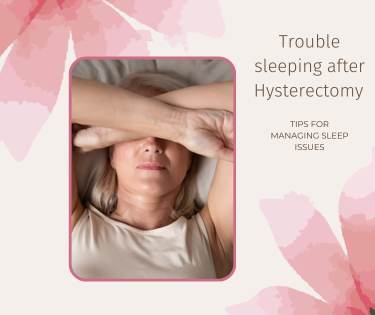Trouble sleeping after hysterectomy – 10 Tips for Managing Sleep Issues
This blog is reader-supported. When you buy through a link on our site, we earn a commission at no extra cost to you. Read more

Do you have trouble sleeping after a hysterectomy?
The importance of a good night’s sleep is obvious, right? It’s essential for your overall health and wellness and the key to a healthy and balanced life.
However, obtaining restful sleep can become challenging for many women following their hysterectomy.
Sleep issues resulting from this major surgical procedure occur more often than you may think, with numerous women grappling with disrupted sleep patterns, insomnia, and a general sense of restlessness.
A woman’s natural healing process depends heavily on her sleep. Understanding the unique challenges you might face after a hysterectomy can significantly impact your recovery. So, if you’ve been experiencing sleep troubles following this life-changing surgery, this article will provide valuable insights and practical tips to achieve peaceful sleep.
The Importance of Sleep while Recovering
Getting sufficient sleep is crucial to good health and well-being, and it becomes even more critical after a major surgery like a hysterectomy. As we sleep, our bodies repair and rejuvenate themselves, and the brain processes the day’s events and prepares for the next day.
Good quality sleep can help to reduce stress, improve mood, enhance memory and cognitive function, and strengthen the immune system. On the other hand, the impact of disrupted sleep goes beyond feelings of tiredness. Fatigue resulting from poor sleep can affect daily functioning, mood, and concentration.
Can a hysterectomy cause insomnia?
After a hysterectomy, many women experience pain, discomfort, and other physical symptoms that make sleeping difficult. Some of the most common sleeping issues after hysterectomy include:
Pain and discomfort
Pain, discomfort, and tenderness are common after a hysterectomy, and one’s ability to find a comfortable position often causes trouble sleeping after a hysterectomy. The surgery involves an incision in the abdominal area or through the vagina, depending on the type of hysterectomy performed. Due to this, the incision site and the surrounding pelvic region can be sources of pain and discomfort during the recovery period.
The wound area may feel sore, tender, and sensitive for some time after the surgery. This discomfort can intensify by movements, pressure, or contact with clothing or bedding. When it comes to finding a suitable sleeping position, the pain around the incision site can make it challenging to lie on the stomach or the side. Consequently, women undergoing a hysterectomy often struggle to find a position that provides relief and allows for restful sleep.
Insomnia
Insomnia, the inability to fall asleep or stay asleep, is a prevalent problem experienced by many individuals after undergoing major surgery, including a hysterectomy. This condition can result from several factors, including pain, discomfort, anxiety, and medication side effects. Medications used during or after surgery might interfere with sleep after the operation. Evidence suggests that general anesthesia can disrupt sleep, particularly in older people. In addition to anesthesia, antibiotics, steroids, sedatives, and respiratory medications can also affect sleep after surgery.
Night sweats
Some women experience hot flashes and night sweats after hysterectomy, disrupting sleep and leading to fatigue and other symptoms. The hormonal changes accompanying a hysterectomy can trigger hot flashes and night sweats. Estrogen is known to regulate body temperature, and the sudden drop in estrogen levels can malfunction the body’s thermoregulatory system. Night sweats during this period can be particularly problematic. These sudden and intense episodes of excessive sweating can occur during sleep, leading to disrupted sleep patterns and subsequent fatigue and other symptoms.
10 Tips for managing trouble Sleeping After Hysterectomy
Here are a few ways to improve your chances of getting good-quality sleep after a hysterectomy:
1. Preparing the bedroom
If you have trouble sleeping after a hysterectomy, ensure your bedroom is ideally suited to good sleep. The sleep environment plays a vital role in ensuring restful sleep. Keeping the bedroom cool and using fans or air conditioning can also create a more comfortable sleeping environment. Furthermore, a pillow and mattress that are comfortable are worthwhile investments.
2. Managing night sweats
Trouble sleeping after hysterectomy due to night sweats requires a comprehensive approach. It is possible to alleviate symptoms and improve sleep quality by using several strategies.
Non-hormonal approaches can also be beneficial. As we already discussed, preparing the bedroom for a good night’s sleep is essential. But dressing in lightweight, breathable sleepwear made of natural fibers like cotton can help regulate body temperature at night.
3. Try different sleeping positions
Try out various sleeping positions to discover which one is the most comfortable for you. Some women find that sleeping on their side with a pillow between their knees can help to relieve pressure on the pelvis. Lying on your back and side are the best sleeping positions after hysterectomy. It is up to you to decide what position suits you best for sleeping based on your comfort and any health concerns you may have. After a hysterectomy, some women have lower back pain that prevents them from sleeping supine, and others have shoulder or hip pain that prevents them from sleeping on their side.
4. Using pillows
Pillows can help support different body parts and reduce pain and discomfort. Aside from medication, additional aids such as supportive pillows can offer relief and facilitate finding a comfortable sleeping position. Placing a pillow under the knees or between the legs can help alleviate pressure on the pelvic area and reduce discomfort. Similarly, a pillow to support the back can help distribute weight and support the body and provide a more comfortable sleeping posture.
5. Relaxation techniques
Practice relaxation techniques like deep breathing, meditation, and guided imagery to help you unwind and prepare for sleep. If you have trouble sleeping after hysterectomy, engaging in relaxation techniques before bed, such as deep breathing exercises or gentle stretching, can help promote relaxation and ease muscle tension.
Medical Interventions
Sometimes, medications are needed to help you sleep better after a hysterectomy. Some options include:
6. Medications for pain and sleep
Your doctor may prescribe pain medications or sleep aids to help you manage symptoms and get better rest. Be sure to follow the instructions carefully and only take medications as directed. Managing pain and discomfort during sleep after a hysterectomy is crucial for facilitating restful and restorative rest.
7. Hormone replacement therapy
If your hysterectomy involves the removal of your ovaries, hot flashes, and night sweats may occur. Hormone replacement therapy (HRT) can help to relieve these symptoms and help with trouble sleeping after hysterectomy. HRT involves using estrogen or other hormones to supplement the body’s declining hormone levels. HRT can effectively reduce hot flashes and night sweats, thereby promoting better sleep. Based on your circumstances and medical history, you must consult a healthcare professional to determine if you are a suitable candidate for HRT.
8. Over-the-counter treatments may be helpful.

Several over-the-counter remedies may help you fall asleep, including Melatonin, Magnesium, or herbal products. Your doctor will need to approve their use, and he or she may suggest some other alternatives.
Post-Surgery Sleep Schedule
Getting back into a regular sleep routine can take time after a hysterectomy, but it is important to start working towards it as soon as possible. Here are some tips for developing a post-surgery sleep schedule:
9. Getting back into a regular sleep routine
Keep your body’s internal clock in check by waking up at the same time and going to bed at the same time every day. Every night, from when you begin to prepare for bed to when you lie down to sleep, your bedtime routine should be the same. Whenever you start your routine, your mind and body automatically recognize the need to wind down.
10. While healing
It’s recommended to eat a healthy diet, reduce caffeine, stay hydrated, and avoid activities that may put an unnecessary strain on your incision site. It’s important to stay active. Gentle exercise like walking can help to improve circulation, reduce pain and stiffness, and promote better sleep after a hysterectomy.
Read also: Side effects of hysterectomy that may take you by surprise.
Frequently asked questions
It would be best not to sleep on your stomach until you have entirely healed from your hysterectomy. Generally, abdominal hysterectomy recovery takes 6-8 weeks, while vaginal and laparoscopic hysterectomy recovery takes less time.
Symptoms of insomnia can last anywhere from a few weeks to several months after undergoing hysterectomy surgery. It usually lasts a few days to a few weeks. In general, major surgery disrupts sleep more than minor surgery. Poor sleep can also result from procedures that require a hospital stay.
If you are used to doing so, it should be possible to continue sleeping on your side during recovery from a hysterectomy. It may also help relieve gas pain after hysterectomies, which can be very uncomfortable. It would be best to speak with your doctor to ensure this position is right for you.
Conclusion
Getting enough sleep after a hysterectomy is important for your overall health and well-being. While it can be challenging to get good quality sleep during the recovery period, there are many things that you can do to improve your chances of getting restful sleep. Follow these tips, and trouble sleeping after a hysterectomy will soon be something of the past.
Sources:


Hello, I’m having a robotic hysterectomy on July 22, I’m concerned that my bed might be to high to get into. so I’m wondering if anyone else had a high bed if they had issues getting in the bed? or should I sleep in recliner? Also worried about sex life afterwards…